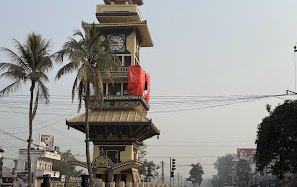
The whole world is fighting the coronavirus pandemic but there are those who want to cash in on the tragedy. Corruption always does not mean the act of giving or taking a bribe. The Oxford Learners’ Dictionary defines corruption as ‘dishonest or illegal behavior, especially of people in authority'. To face the crisis caused by the coronavirus in the country, the government will reallocate a large budget to deal with the spread of the coronavirus in the country. It's high time to be alert because this situation has generated alerts about the good management of money. We need to activate real-time audits for public procurement processes and concentrate all information related to government procurement on a single platform. The emergency is not a justification to avoid proper accountability.
Coronavirus is really a serious thing, and its threat should not be minimized. But it seems to me that the level of panic in the world does not correspond to the real threat. There have been different epidemics that humanity has held the ability to wipe off the face of the Earth, and then the hype in the media subsided and everything returned to normal.
Nepal is one of those countries where poverty does not only cause underdevelopment and marginal living standard of the people, but because of the corruption of its leaders, the economic downfall seems to be gradually taking place. According to World Bank figures, 7% ( 2,443,897) of the total population are living under extreme poverty with 1.90 dollars a day and the prices of products have doubled in recent years.
Negligence and corruption kill more than natural disasters. The mega-corruption associated with public investment projects and development activities is not a new thing in our society. It's not new that for any government in Nepal, the regime has taken advantage of the drama of the families affected by such disasters to make populist and political propaganda. Government corruption has almost always been linked to natural calamities. This is because a corrupt politician who holds power to take over a large part of the national and international public resources is defined to attend to the consequences of disasters, for their own enrichment and that of their loved ones. Remember, Government corruption is also said to be a collective act of murder because corruption causes practically the same damage as the slaughter of thousands of people who only ask for what belongs to them, but have taken away: freedom, democracy, Justice and respect for their human rights.
The link between corruption and distorter exists before they even exist. This is due to the ineptitude, inefficiency, and lack of probity of the rulers who do not properly execute the necessary preventive actions. In the face of the health emergency facing the country, the authorities must respond in a timely manner and one of the main tasks they must do efficiently is the agile and adequate use of public resources to meet all the needs that are generated.
There are identified corruption risks and key preventive strategies to ensure that the direct purchases and contracting that states are making in the face of the health crisis caused by the COVID-19 virus pandemic, meet the objectives of alleviating the impacts on the health of citizens and local economies in an integral way and that they are not diverted by corruption and opportunism. According to Transparency International, corruption may grow in any country due to the Covid-19 crisis. We need to activate real-time audits for public procurement processes and concentrate all information related to government procurement on a single platform. The emergency is not a justification to avoid proper accountability. Corruption in emergencies increases the impact on society, and we have to be alert to prevent it. We need to follow certain measures to avoid corruption. Transparency and open data, resource management, accountability, guaranteeing economic competition and monitoring public spending during the contingency are immediate measures that could be highlighted.
Prevention and the resilience of society depends on the management of governments at all levels- whether it is a tragic earthquake, flood or this corona pandemic, which has resulted in the loss of human lives, thousands of victims, loss of homes, businesses and road infrastructure, leads us to ask ourselves the following questions: Are we prepared to manage and overcome this pandemic without corruption? Is the state institution effective?
Corruption should not be a reason to withhold help in these desperate humanitarian crises. Whatever happens, fear of misuse of funds should not be a barrier to humanitarian action.

Deepak Raj Joshi
(The author is a lecturer and IT consultant. He also writes fiction under the name of Kapeed Joshi. He can be reached by email at info@dipakjoshi.com.np.)
- Criminal Governance & Neopatrimonialism
- Jul 29, 2024
- Participatory Democracy
- Dec 07, 2023
- Rise Of Populism Boon Or A Bane
- Aug 13, 2023
- The Collapse Of Confidence And The Rise Of RSP
- May 17, 2023
- Lottocracy
- Apr 30, 2023















